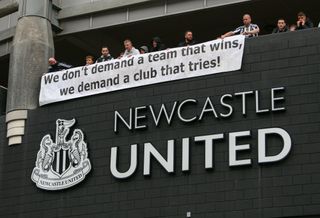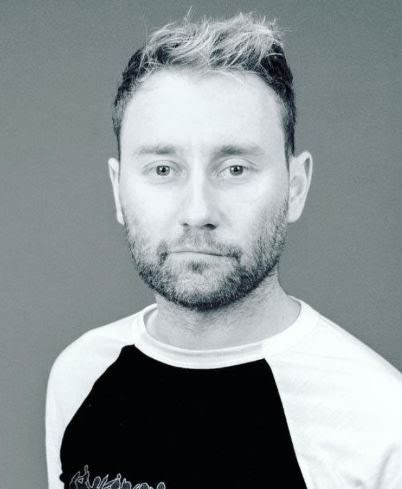'Ironically none of it's black and white': A Newcastle fan's attempt to make sense of their Saudi situation
The Magpies’ Middle Eastern investment has divided English football down the middle. Lifelong supporter Adam Clery explains why it’s left the fanbase in a tricky position

"We don’t demand a team that wins, we demand a club that tries,” read the banner. Such was the rot that had set in at Newcastle United in Mike Ashley’s 14 years, that any concerns the club’s fans had over a takeover merely extended as far as ‘when’, never ‘whom’.
The two entirely avoidable relegations, the rebranding of the stadium as the Sports Direct Arena, the hiring of Joe Kinnear, the employment tribunal with Kevin Keegan, the failure to retain Rafael Benitez.
The decision to release Jonas Gutierrez – a man who mere months prior had made his footballing return after battling cancer – by asking the also-released Ryan Taylor if he could “pass the phone to Jonas”. Newcastle fans would, understandably, have greeted any new owners with the most open of arms by 2020.
So much so, that when reports first emerged of the acquisition led by Amanda Staveley, the fact it involved an investment group that would make them the “richest club in the world” was almost a footnote on Tyneside.
The Public Investment Fund, the sovereign wealth fund of Saudi Arabia controlled by Crown Prince Mohammed bin Salman, was about as far removed from the club’s previous administration as it was possible to be.
One was linked to a nation state with geopolitical influence on a global scale, the other was a guy from Walsall who flogged trainers on the cheap and once held crunch talks with a manager while eating a £7.95 spaghetti bolognese.
What rendered the Ashley era untenable was its overall aspirations. A one-club city with a famously obsessive fanbase, who had flirted with tangible success in recent memory, were simply incompatible with an owner devoid of ambition.
Spending just enough to survive in the Premier League, advertising the club as a stepping stone to potential signings, and employing managers who wouldn’t question those decisions. It wasn’t going to need a sovereign wealth fund to bring Newcastle United back from its necrosis, but that’s what they got.
They will be (and already have been) a team that wins. As that banner read though, it was merely that they became a club that tried that ingratiated the new owners with the vast majority of the fanbase.
That, for a lot of people, is the problem. Though the public face of the takeover consists of British business magnate Staveley, her British-Iranian financier husband Mehrdad Ghodoussi, plus British billionaire and investor Jamie Reuben and family, they account for only 20 per cent of the club’s actual ownership.
The remaining 80 per cent, and 100 per cent of the controversy, belongs to PIF. What makes the conversation such a difficult one is that, ironically for this of all clubs, almost none of it is black and white.
Even the very label of ‘sportswashing’, used time and again by the club’s critics to condemn the takeover, is easy to dismiss for those who wilfully refuse to see a problem.
Sportswashing was Berlin hosting the Olympics in 1936 to allay the world’s fears over the political direction that Germany was taking.
Sportswashing was American tobacco companies paying all of the major baseball stars to advertise their product when reports were beginning to suggest smoking was bad for your health.
Sportswashing was Russia invading Ukraine in 2014 while they were hosting the Winter Olympics, safe in the knowledge that the event would dominate news agendas that week.
Mass appeasement of a population through the distraction of sport on a national, continental or global scale. That’s not something that’s even remotely possible in the fiercely tribal arena of English club football.
For every one Newcastle fan dancing outside the ground with a tea-towel wrapped around their head, hundreds of supporters of other sides decry Saudi Arabia’s human rights record, and the horrific murder of journalist Jamal Khashoggi in 2018.
How can you call it sportswashing, some Magpies fans will argue, when it’s having literally the opposite effect? Well, it’s the bigger picture. Signing Harvey Barnes and announcing a fanzone in the city centre isn’t “mass appeasement on a global scale”, but the staggering sum spent this summer in the Saudi Pro League is. LIV Golf is.

A potential joint World Cup bid with Egypt and Greece is, were that to go ahead. As difficult as it is to pin down exactly what role owning Newcastle United plays in all of that, it’s part of the same project, run by the same people, and pushing the same ambitions.
Saudi Vision 2030. Under Bin Salman’s rule, Saudi Arabia has embarked upon the biggest PR exercise the world has ever seen. Simultaneously trying to modernise the country economically and socially, while at the same time projecting an image of being an upwardly mobile and financially vibrant player on the world stage, they want the eyes of the entire globe, and specifically the west, to light up at the very sight of it all.
Few things elicit that reaction easier than football. Although there have been immediate comparisons to the equally as expensive but ultimately abortive attempts of other nations to ‘buy’ a major league (Oscar still plays in China, in case you’re wondering), the mass influx of big name players to the Saudi Pro League is very different.
For all that most people scoffed at Cristiano Ronaldo’s claims that it would soon be one of the top five leagues in the world, that is the cast-iron aim of the Saudi government – they’ve already proved this summer they have both the money and the plan to make that a reality.
At the time of writing, the lengthy list of names who’d been lured there during the current transfer window included Karim Benzema, N’Golo Kante, Fabinho, Riyad Mahrez, Sadio Mané, Jordan Henderson, Roberto Firmino, Edouard Mendy, Kalidou Koulibaly, Ruben Neves, Marcelo Brozovic, Sergej Milinkovic Savic and Allan Saint-Maximin, plus coaches Steven Gerrard, Slaven Bilic and Jorge Jesus. Part of Saudi Arabia’s grand plan, however far removed it feels, is Newcastle United.
Ownership of a top-flight English team, and successfully turning them into a European football staple, provides PIF with two things vital to their long-term aims – credibility as a footballing entity who are here for the long haul, and a seat at the table of both the Premier League and UEFA. They now have a voice at the highest levels of the game, and have to be taken seriously as a result.

Thus, if there is sportswashing going on, it was never aimed at the fans, it was aimed at the governing bodies. When money talks, it doesn’t do so wearing a replica shirt with a pint in its hand, it does it in an £8,000 suit at a FIFA conference in Zurich.
Whatever your thoughts on the takeover, whether you’re a Newcastle supporter or not, it’s impossible to expect one fanbase to be the sole moral arbiters of the game.
Football has slowly allowed increasingly distasteful elements of business, celebrity, politics and consumerism to swallow it whole over the past few decades, and one group of fans was never going to be where the line was finally drawn.
The sovereign wealth funds of nation states with deplorable human rights records, and prehistoric laws regarding the treatment of women and social groups (including LGBT rights) they judge to be “distasteful”, should not be allowed to own Premier League football clubs.
But neither should men like Mike Ashley.
Newcastle fans tried their best to make the latter point for over a decade and were met with deaf ears by rivals of other clubs and executives alike. That many Newcastle fans are returning the favour to those who, understandably, view the new administration as being worse by orders of magnitude is seen as fair game to some, and grossly hypocritical to others.
The truth, as ever, is somewhere in between. Until fans are given a shred of the power required to determine who does and doesn’t control their club, the only place you’ll ever truly hear their voice is within the confines of a matchday stadium.
For Newcastle, whether it’s boom or bust, it’s right where it’s always been.
More Saudi Arabia news
Cristiano Ronaldo claims his role as 'pioneer' for Saudi Pro League has helped attract star names
Former Newcastle United defender Federico Fernandez insists players never discussed human rights issues at the time of the club's Saudi takeover
Jordan Henderson's Saudi interview smacked of a player with a bruised ego

Thank you for reading 5 articles this month* Join now for unlimited access
Enjoy your first month for just £1 / $1 / €1
*Read 5 free articles per month without a subscription

Join now for unlimited access
Try first month for just £1 / $1 / €1
Get the FourFourTwo Newsletter
The best features, fun and footballing quizzes, straight to your inbox every week.
Adam published his first article for FourFourTwo in 2015, but didn’t publish his second until seven years later in 2022. A figure that would put him near the top end of any ranking for Longest Time Between Appearances For One Club. In the time between he plied his trade as both a writer and presenter on YouTube, earning the dubious distinction of being “The James Milner of WhatCulture”. Be that because he was capable of playing any role, or just because it felt like he’d been around forever, depends on who you ask. And yes, that is him from the Football Manager documentary and, no, he doesn’t want to talk about it.
Most Popular


By Adam Clery

By Matt Ladson
